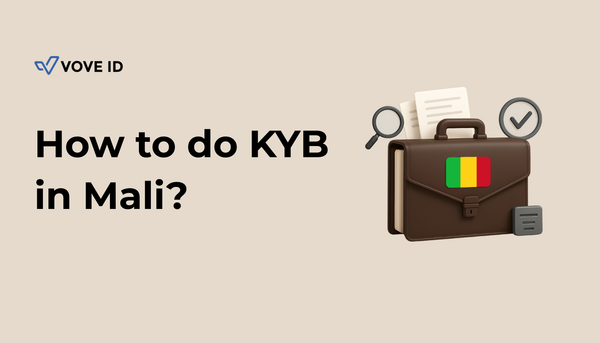AML Compliance in Tunisia: A 2025 Guide for Fintechs and Regulated Businesses
Discover Tunisia’s 2025 AML compliance framework, fintech challenges, and how VOVE ID powers secure onboarding, and compliance.

Tunisia has significantly strengthened its Anti-Money Laundering (AML) and Counter-Terrorist Financing (CFT) framework since adopting Basic Law 2015-26 and its 2019 amendments. Positioned at the crossroads of Europe, North Africa, and the Middle East, Tunisia faces notable financial crime risks tied to trade, remittances, and a sizable informal economy, estimated to account for 30–40% of GDP. For fintechs, banks, payment service providers, and other regulated entities, navigating this environment requires robust compliance practices aligned with Financial Action Task Force (FATF) standards.
The rise of digital financial services in Tunisia, including mobile payments and remittances, has heightened the need for effective AML/CFT measures. Solutions like VOVE ID support businesses in meeting FATF expectations by providing tools for customer due diligence, and risk assessment.
The Regulatory Framework
Tunisia’s AML/CFT system is primarily governed by Basic Law 2015-26, amended by Law 2019-09, which criminalizes money laundering and terrorism financing while imposing strict obligations on financial institutions and designated non-financial businesses and professions (DNFBPs).
Key Regulatory Bodies
- Commission Tunisienne d’Analyse Financière (CTAF): Tunisia’s FIU, receiving and analyzing suspicious transaction reports (STRs).
- Central Bank of Tunisia (BCT): Supervises banks, payment service providers, and microfinance institutions.
- Ministry of Finance: Oversees fiscal transparency and international cooperation.
- MENAFATF: Evaluates Tunisia’s AML/CFT framework as a FATF-style regional body.
Since 2019, Tunisia has collaborated with the EU Global Facility on AML/CFT to improve beneficial ownership transparency, supervisory capacity, and risk-based monitoring.
Tunisia’s Exit from the FATF Grey List
In October 2019, Tunisia was officially removed from the FATF grey list after demonstrating substantial reforms, including stronger beneficial ownership requirements and more effective FIU operations. This milestone boosted investor confidence, enhanced Tunisia’s global reputation, and underlined its commitment to fighting financial crime.
International Cooperation
Tunisia actively participates in global AML/CFT initiatives, including information-sharing agreements with other FIUs and compliance with United Nations sanctions lists. Given Tunisia’s role as a trade and remittance hub, international cooperation is critical in tackling risks like trade-based money laundering and smuggling.
Key AML Requirements for Businesses
- Customer Due Diligence (CDD): Verifying identities, beneficial ownership, and purpose of business relationships.
- Enhanced Due Diligence (EDD): Required for PEPs, high-risk customers, and cross-border transactions.
- Suspicious Transaction Reporting (STRs): Prompt reporting to the CTAF.
- Record Keeping: Client and transaction data retained for at least ten years.
- Risk-Based Approach: Tailoring internal controls to sector-specific risks.
- Sanctions Compliance: Screening transactions against UN and domestic lists.
Failure to comply can result in regulatory fines, license suspension, or reputational damage, making strong compliance systems essential.
Compliance Challenges in Tunisia
Despite progress, Tunisian businesses still face hurdles:
- Cash-Dependent Informal Economy: Estimated at 30–40% of GDP, complicating transaction traceability.
- De-Risking Trends: NGOs and civil society groups risk losing access to financial services.
- Limited Digital Infrastructure: In rural areas, poor connectivity hinders effective identity verification.
- Evolving Financial Crime: Trade-based money laundering and illicit cross-border flows remain key risks.
Here, technology-driven solutions like VOVE ID’s AML suite—with biometric onboarding, automated sanctions screening, and AI-powered risk assessment—help close compliance gaps while ensuring operational efficiency.
Industry Impact
- Fintech and Mobile Money: Mobile wallets and digital payment platforms drive financial inclusion but heighten AML risks.
- Remittances: Diaspora inflows exceeding $2 billion annually require close monitoring.
- Crypto and Digital Assets: Regulators are exploring oversight of VASPs to align with FATF recommendations.
- Foreign Direct Investment (FDI): Strong AML frameworks increase Tunisia’s attractiveness to global investors.
Strategies for Effective Compliance
- Leverage Technology: Deploy tools like VOVE ID to streamline CDD, EDD, and monitoring.
- Staff Training: Regular AML/CFT training helps identify and report suspicious activities.
- Risk Assessments: Tailor assessments to business models and emerging risks.
- Regulator Engagement: Stay aligned with evolving guidance from the CTAF and BCT.
- Third-Party Partnerships: SMEs can leverage compliance providers to reduce costs and complexity.
Tunisia’s informal economy is one of the largest in North Africa, accounting for up to 40% of GDP, making it a major focus of AML/CFT enforcement efforts.
Conclusion
As Tunisia continues to strengthen its AML/CFT framework, regulated businesses must align with both domestic laws and global standards to thrive in a competitive market. Fintechs, banks, and digital service providers that invest in modern compliance infrastructure will be better positioned to balance innovation with security.
Solutions like VOVE ID provide digital identity verification, and risk-based screening—helping Tunisian businesses meet regulatory requirements while building trust and sustainable growth.
From digital onboarding to continuous AML monitoring, VOVE ID helps fintechs and regulated businesses in Tunisia build trust and stay compliant.




